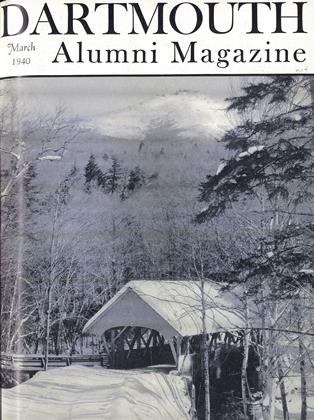SAMUEL HOPKINS WILLEY, CLASS 1845, EDUCATIONAL PIONEER IN FAR WEST
[.Published by special arrangement withCharles Scribner's Sons, New York Publishersof the Dictionary of American Biography.Fully protected by copyright.]
WILLEY, SAMUEL HOPKINS (Mar. 11, 1821-Jan. 21, 1914), pioneer California clergyman and educator, was born in Campton, Grafton County, N. H., the son of Darius and Mary (Pulsifer) Willey. His earliest American ancestor was Isaac Willey who was in Boston, Mass., as early as 1640, soon removed to Charlestown, and later went with John Winthrop Jr., to what is now New London, Conn. Samuel graduated from Dartmouth College in 1845 and fr°m Union Theological Seminary, New York, in 1848. On Nov. 30 of the same year he was ordained by the Fourth Presbytery of New York. He then went to Medford, Mass., with the expectation of settling there as pastor of the Congregational church.
Circumstances were conspiring to take him to the other side of the continent, however. With the acquisition of California by the United States and the discovery of gold there, the officials of the American Missionary Society felt a duty to the people that were flocking thither. They persuaded Willey to accept a mission to the newly acquired territory, and accordingly, on Dec. 1, 1848, he sailed from New York for the Pacific Coast by way of the Isthmus of Panama. Arriving at Chagres, the ship's company was taken up the Chagres River to Cruces, and then overland to Panama, encountering cholera on the way. After a month's delay, they went up the coast on the California, the first steamship to make the trip, and landed at Monterey on Feb. 23, 1849. Two days later Willey conducted his first service there. Monterey was at that time the residence of the governor and army headquarters, and Willey remained until the importance of the place passed with the organization of a state government. The council of administration appointed him chaplain to the post, securing a commission for him from Washington. He opened a school in Col ton Hall, where he taught forty or fifty children. Securing subscriptions of some $1500 from the residents, he sent to New York for books and established what was probably the first public library in California. At the constitutional convention which opened Sept. 1, 1849, he served as chaplain, alternating in the duties of that office with Padre Juan Ramirez. In May 1850 he transferred his activities to San Francisco. Here he labored for twelve years, establishing and becoming pastor of the Howard Presbyterian Church in the section of the city then called "Happy Valley"; taking an active part in the opening of public schools; assisting in editing The Pacific, a religious periodical; and serving as representative for the American Missionary Society in the extension of religious work in the state.
EDUCATIONAL PIONEER
Soon after his arrival in California he interested himself actively in a project for founding a college. Although encouraging progress was made, the enterprise met with difficulties which caused its temporary abandonment. When in 1853, however, Henry Durant opened an academy at Contra Costa (Berkeley) in the hope that it would develop into a college, Willey became one of his leading advisers and helpers: On Apr. 13, 1855, legislature incorporated the College of California in Berkeley, with Willey as one of the trustees. The board took over the property and control of the academy, and in iB6O collegiate work was begun. Two years later Willey resigned his pastorate with the idea of continuing his ministry in the East, but was persuaded to remain in California and devote himself to building up the college. Accordingly, he was appointed its vice president and served as acting president until 1869, when the property and management of the institution were turned over to the board of regents of the University of California, established by legislative enactment in 1868.
For the next ten years (1870-1880) he was pastor of the Congregational church in Santa Cruz, Cal., and from 1880 to 1889, of the Congregational church in Benicia. He then became president of Van Ness Seminary, San Francisco, in which capacity he served until 1896. Thereafter, he made his home in Berkeley, engaged chiefly in writing. He was the author of Decade Sermons (1859); A Historical Paper Relating to Santa Cruz, California (1876); Thirty Years in California (1879); A History of the College of California (1887); The History of the First Pastorateof the Howard Presbyterian Church, SanFrancisco, California (1900); The Transition Period of California From a Provinceof Mexico in 1846 to a State of the American Union in 1850 (1901). He was married, Sept. 19, 1849, to Martha N. Jeffers of Bridgeton, N. J., by whom he had six children.
 View Full Issue
View Full Issue
More From This Issue
-
 Article
ArticleEducation At Its Best
March 1940 By ARTHUR DEWING '25 -
 Sports
SportsBig Green Teams
March 1940 By Whitey Fuller '37 -
 Article
ArticleAn Obligation to Alumni
March 1940 By BEN AMES WILLIAMS '10 -
 Article
ArticleHanover Browsing
March 1940 By HERBERT F. WEST '22 -
 Class Notes
Class Notes1930*
March 1940 By ALBERT I. DICKERSON -
 Article
ArticleThe College in the Sixties
March 1940 By DR. WILLIAM LELAND HOLT








